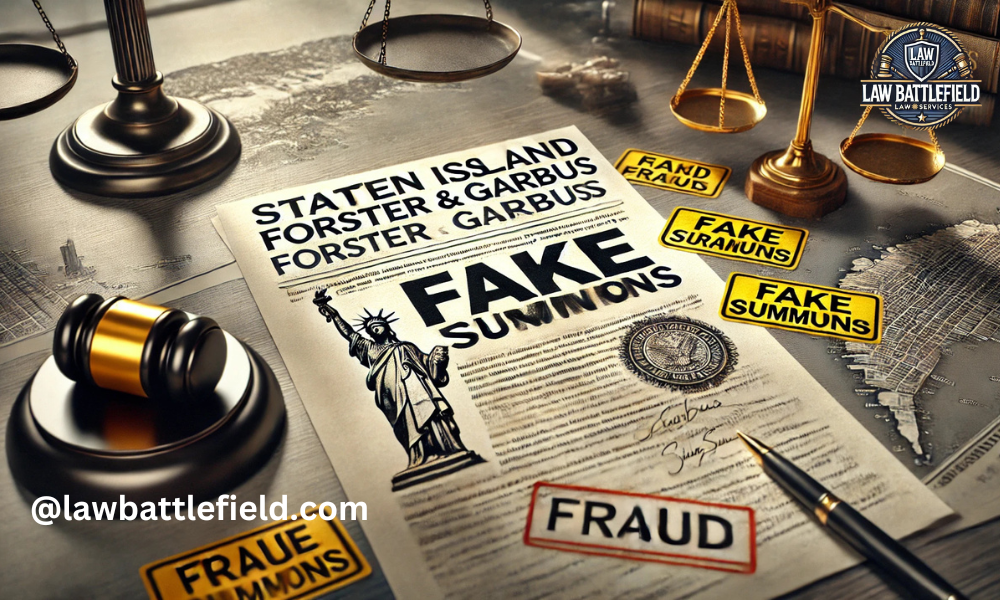Introduction To Staten Island Attorney Forster And Garbus Fake Summons
Forster & Garbus is a law firm known for handling debt collection cases in Staten Island and across New York. Recently, the firm has come under scrutiny for allegedly sending fake summonses to individuals. These allegations have raised serious concerns about the fairness and legality of their practices. Many people feel confused and worried when they receive such documents, not knowing if they are real or fake.
This article will explain everything you need to know about the issue of fake summonses, what steps to take if you encounter one, and how to protect yourself from unfair practices. If you’re searching for answers about Staten Island attorneys or the actions of Forster & Garbus, you’re in the right place.
Background Of Forster & Garbus
History And Operations Of The Law Firm
Forster & Garbus, LLP, based in Commack, New York, was a law firm specializing in debt collection. Established over 50 years ago, it built a reputation in the creditors’ rights sector. In April 2023, Abrahamsen Gindin LLC (AG Law), a multi-state creditors’ rights firm headquartered in Scranton, Pennsylvania, acquired Forster & Garbus. This acquisition aimed to integrate advanced technology and expand services across multiple states.
Their Role In Debt Collection Within Staten Island And New York
Forster & Garbus played a significant role in debt collection throughout New York, including Staten Island. The firm represented major creditors such as Discover, Citibank, Sallie Mae, Navient, and the National Collegiate Student Loan Trusts. Between 2014 and 2016, the firm filed over 99,000 debt-collection lawsuits, often without possessing complete documentation to support the debts. This practice led to legal actions and raised concerns about their methods in pursuing alleged debts.
Understanding Fake Summons
Definition And Characteristics Of A Fake Summons
A fake summons is a document designed to look like an official legal notice. It is often sent by debt collectors or law firms to pressure individuals into responding or making payments. These documents may mimic the format, language, and style of real court-issued summonses, making them difficult to identify as fraudulent.
Some common characteristics of fake summonses include:
- Lack of official court seals or case numbers.
- Errors in formatting, grammar, or spelling.
- Ambiguous instructions or overly urgent demands.
- Contact information leading only to the sender, not a court or official agency.
- Lack of proper filing with the court system.
Differences Between Legitimate And Fake Summonses
Distinguishing between a legitimate summons and a fake one is crucial to protect your rights. A legitimate summons:
- Is issued by a court and contains an official case number.
- Clearly states the name of the court where the case is filed.
- Provides accurate information about the parties involved and the nature of the complaint.
- Includes instructions for responding to the court, including deadlines and procedures.
A fake summons, on the other hand:
- May lack proper legal details or court identification.
- Often uses threatening or vague language to intimidate recipients.
- Directs individuals to contact the sender directly rather than responding through official legal channels.
- Is not filed with the court, making it unenforceable.
By understanding these differences, you can identify fake summonses and avoid falling victim to deceptive practices. If you suspect a summons is fake, consult an attorney or contact the court to verify its authenticity.
Allegations Against Forster & Garbus
Details Of The Fake Summons Allegations
Forster & Garbus, a debt-collection law firm operating in Staten Island and throughout New York, has faced serious allegations regarding their debt collection practices. The firm was accused of sending misleading summonses to individuals, pressuring them to respond to debts without proper legal procedures. These actions raised concerns about the authenticity of the summonses and the firm’s adherence to legal standards.
Specific Cases And Complaints Filed Against The Firm
In 2019, the Consumer Financial Protection Bureau (CFPB) filed a lawsuit against Forster & Garbus, alleging that between 2014 and 2016, the firm filed over 99,000 debt-collection lawsuits without sufficient documentation to support the debts. The CFPB claimed that the firm misrepresented the level of attorney involvement in these cases, violating the Fair Debt Collection Practices Act and the Consumer Financial Protection Act.
Additionally, in 2018, a class-action lawsuit was filed against Forster & Garbus and Capital One Bank, accusing them of using false affidavits of service to obtain default judgments against consumers. The plaintiffs alleged that the defendants filed bogus affidavits, leading to judgments without the consumers’ knowledge.
Legal Actions And Investigations
Overview Of Lawsuits And Regulatory Actions Taken Against Forster & Garbus
In May 2019, the Consumer Financial Protection Bureau (CFPB) filed a lawsuit against Forster & Garbus, LLP, a debt-collection law firm based in New York. The CFPB alleged that between 2014 and 2016, the firm filed over 99,000 debt-collection lawsuits without sufficient documentation to support the debts. The lawsuit claimed that Forster & Garbus misrepresented the level of attorney involvement in these cases, violating the Fair Debt Collection Practices Act (FDCPA) and the Consumer Financial Protection Act (CFPA).
Outcomes Of These Legal Proceedings
In January 2023, Forster & Garbus reached a settlement with the CFPB. The stipulated final judgment required the firm to:
- Retain Specific Documentation: Before filing any new debt-collection lawsuit, the firm must possess detailed documents supporting the debt, including the name of the original creditor, evidence of consumer authorization, the chain of title, and a breakdown of the debt amount.
- Ensure Attorney Review: An attorney whose name appears on the complaint must review the supporting documentation and certify that the complaint aligns with that information.
- Dismiss Unsupported Lawsuits: The firm must dismiss any pending lawsuit if it cannot certify compliance with the documentation and attorney review requirements within 120 days of the court’s order.
- Pay a Monetary Penalty: Forster & Garbus agreed to pay a $100,000 penalty, which would be deposited into the CFPB’s victims relief fund.
This settlement aimed to halt the firm’s practice of filing unsupported debt-collection lawsuits and to ensure compliance with federal consumer protection laws.
Identifying A Fake Summons From Forster & Garbus
Red Flags And Warning Signs To Watch For
When dealing with a potential summons from Forster & Garbus, it’s essential to know the red flags that indicate it might be fake. Common warning signs include:
- No Official Court Seal: Authentic summonses will have a court seal, indicating that it has been issued by a legitimate court.
- Generic or Incorrect Information: Fake summonses often include vague details about the debt or incorrect information about the recipient.
- Urgent or Threatening Language: Phrases like “Immediate Action Required” or threats of severe consequences are often used to intimidate.
- Contact Information Leading Only to the Sender: Genuine summonses include court contact details, not just the debt collector’s.
- Lack of Case Number or Filing Information: Every legitimate court-issued summons includes a case number and filing date.
Steps To Verify The Authenticity Of A Summons
If you suspect a summons from Forster & Garbus is fake, follow these steps to confirm its legitimacy:
- Contact the Court: Use the contact information for the court mentioned in the document. Verify if a case has been filed under the provided case number.
- Review the Details: Check for accurate information such as your name, address, and details of the alleged debt. Errors or vague descriptions can indicate a fake document.
- Consult an Attorney: Seek advice from a legal professional who specializes in debt collection issues. They can assess the document and advise you on next steps.
- Check for Proper Service: Legitimate summonses must be served according to the law, either in person or via authorized methods. If it was delivered in an unusual manner, it might be fake.
- Request Supporting Documentation: If the summons is related to a debt, ask for proof of the debt, such as contracts, payment records, and the chain of title.
- Report Suspected Fraud: If you confirm the summons is fake, report it to the Consumer Financial Protection Bureau (CFPB), your state attorney general, or another regulatory agency.
By staying vigilant and informed, you can protect yourself from fraudulent summonses and ensure you respond appropriately to genuine legal matters.
Consumer Rights In Debt Collection
Overview Of The Fair Debt Collection Practices Act (FDCPA)
The Fair Debt Collection Practices Act (FDCPA) is a federal law designed to protect consumers from abusive, deceptive, and unfair practices by debt collectors. Enacted in 1977, the FDCPA outlines clear rules and guidelines that debt collectors must follow when attempting to recover debts. It applies to third-party debt collectors, including law firms like Forster & Garbus when collecting on behalf of creditors.
Key provisions of the FDCPA include:
- Prohibiting harassment, such as repeated phone calls or abusive language.
- Banning misleading or false statements about the debt.
- Requiring transparency in debt communication, including disclosure of the debt amount and creditor.
- Allowing consumers to dispute a debt and request verification.
Rights And Protections For Consumers Under The Law
Consumers have several important rights under the FDCPA to ensure they are treated fairly during the debt collection process:
- Right to Receive Validation: Debt collectors must provide written notice of the debt within five days of initial contact. This notice must include the amount owed, the name of the creditor, and instructions on disputing the debt.
- Right to Dispute the Debt: Consumers can dispute all or part of the debt within 30 days of receiving the validation notice. The collector must stop collection efforts until the debt is verified.
- Freedom from Harassment: Collectors cannot use threats, profanity, or excessive calls to pressure consumers into paying.
- Protection Against False Claims: Debt collectors cannot misrepresent themselves as attorneys, government officials, or law enforcement. They must also avoid exaggerating the consequences of non-payment.
- Control Over Contact Methods: Consumers can request that collectors stop contacting them or limit communication to specific times or channels.
- Right to Sue for Violations: If a debt collector violates the FDCPA, consumers can file a lawsuit and may be entitled to compensation for damages.
Understanding your rights under the FDCPA empowers you to deal with debt collectors confidently and protects you from illegal or unethical practices. If you believe your rights have been violated, consider consulting an attorney or filing a complaint with the Consumer Financial Protection Bureau (CFPB).
Protecting Yourself From Fake Summons Scams
Practical Steps To Safeguard Against Fraudulent Summonses
- Verify Every Summons
If you receive a summons, contact the court directly using official contact details to confirm its authenticity. Do not rely on information provided in the document itself. - Request Debt Validation
If the summons relates to a debt, request written verification from the debt collector. This should include details about the original creditor, the amount owed, and proof that the debt is yours. - Know Your Rights
Familiarize yourself with the Fair Debt Collection Practices Act (FDCPA) to understand what debt collectors can and cannot do. - Do Not Pay Without Proof
Never make payments based on a summons without verifying its legitimacy. Fraudsters often pressure victims into paying immediately to avoid legal action. - Check for Red Flags
Look for warning signs like a missing court seal, ambiguous language, or a lack of detailed information about the alleged debt. - Consult Legal Help
Reach out to an attorney if you are unsure about the authenticity of the summons or need advice on how to respond. - Monitor Your Credit Report
Regularly review your credit report to check for unfamiliar debts or suspicious activity. This can help you identify fraud early.
Resources And Agencies To Contact For Assistance
- Consumer Financial Protection Bureau (CFPB)
File complaints about debt collection scams or report fake summonses to the CFPB for investigation. Their website provides helpful resources and guides. - State Attorney General’s Office
Many state attorneys general have divisions focused on consumer protection. They can offer advice and help pursue claims against fraudulent practices. - Local Court Clerk
Contact the clerk of the court mentioned in the summons to verify whether the case is legitimate. - Federal Trade Commission (FTC)
The FTC provides resources on identifying and avoiding scams. You can also report fraudulent summonses to them. - Legal Aid Services
Many communities have free or low-cost legal aid services that can provide guidance and representation for individuals facing debt collection issues. - Better Business Bureau (BBB)
Check the reputation of the law firm or debt collector sending the summons. Complaints filed with the BBB may reveal patterns of fraudulent behavior.
By taking these steps and utilizing available resources, you can protect yourself from fake summons scams and ensure you respond appropriately to genuine legal matters.
Case Studies And Personal Accounts
Real-Life Examples Of Individuals Affected By Fake Summonses
- John’s Story: Misleading Debt Collection Attempt
John, a Staten Island resident, received a document claiming he owed a large sum to a credit card company. The “summons” was delivered via regular mail and demanded immediate payment to avoid legal action. Suspicious, John contacted the court listed in the document. He discovered there was no case filed against him, and the document was a fraudulent attempt to collect a non-existent debt. - Maria’s Experience: Default Judgment Without Notice
Maria was shocked to find a default judgment on her credit report for a debt she didn’t recognize. She later learned it stemmed from a summons she never received. Fraudulent service had led to the default judgment. With legal help, Maria was able to challenge the judgment and clear her record, but the process was lengthy and stressful. - James and Forster & Garbus
James received a summons from Forster & Garbus for a debt he had already settled years ago. Concerned about the legitimacy of the claim, he hired an attorney who confirmed the summons lacked proper documentation. The case was dismissed, but the experience highlighted the importance of verifying all claims before taking action.
Lessons Learned And Advice For Others
- Always Verify Documents
Contact the court directly to confirm the authenticity of any summons you receive. Fraudulent documents often use fear and urgency to push people into quick action. - Keep Detailed Records
Retain records of all debts, payments, and settlements. Having documentation can help you dispute false claims effectively. - Know Your Rights
Familiarize yourself with consumer protection laws, like the FDCPA. These laws protect you from abusive practices and provide guidelines for handling debt collection issues. - Seek Legal Help When Needed
If a summons or debt collection attempt feels suspicious, consult an attorney. Legal professionals can identify fraudulent practices and advise you on your options. - Educate Others
Share your experiences with family and friends. Many people are unaware of these scams, and educating others can prevent them from becoming victims.
These stories emphasize the importance of vigilance and awareness when dealing with debt collection summonses. Learning from the experiences of others can help you protect yourself and respond effectively to similar situations.
Legal Implications For Issuing Fake Summons
Potential Consequences For Law Firms And Attorneys Involved
Law firms and attorneys who issue fake summonses can face serious legal and professional consequences, including:
- Regulatory Penalties
Firms found guilty of deceptive practices may face fines and sanctions from regulatory bodies like the Consumer Financial Protection Bureau (CFPB). For instance, Forster & Garbus had to pay a $100,000 penalty as part of a settlement. - Disbarment or License Suspension
Attorneys involved in fraudulent actions risk losing their legal license or facing disciplinary action by their state bar association. - Lawsuits and Damages
Consumers affected by fake summonses can file lawsuits for damages, including emotional distress, lost wages, and financial losses. - Reputational Damage
Firms implicated in fraudulent activities suffer significant reputational harm, leading to loss of clients and business opportunities. - Criminal Charges
In extreme cases, issuing fake legal documents can lead to criminal charges, including fraud or forgery.
Impact On Consumers And The Legal System
- Erosion of Trust in the Legal Process
Fake summonses undermine public trust in the legal system. People may become suspicious of legitimate summonses, making it harder for courts to enforce genuine claims. - Financial and Emotional Strain on Consumers
Victims of fake summonses often experience financial hardship and emotional distress. Many pay illegitimate debts out of fear, while others face lengthy legal battles to clear their names. - Overburdened Courts
Fake summonses create additional work for courts, as individuals seek to verify claims or dispute fraudulent judgments. - Encouragement of Unethical Practices
If left unchecked, fraudulent activities like fake summonses set a dangerous precedent, encouraging other firms to engage in similar behavior.
Conclusion
Summary Of Key Points
This article has explored the issues surrounding Forster & Garbus and the allegations of fake summonses. It covered the firm’s history, the characteristics of fake summonses, legal actions taken against the firm, and the impact on consumers. Practical advice on identifying fake summonses, understanding consumer rights, and safeguarding against scams was also provided.
Emphasis On The Importance Of Vigilance And Legal Awareness
Being informed and vigilant is crucial when dealing with debt collection issues. Understanding your rights under laws like the Fair Debt Collection Practices Act (FDCPA) can help you recognize fraudulent practices and protect yourself. If you receive a suspicious summons, always verify its authenticity through official channels and seek legal advice when needed. Awareness and proactive action can prevent scams and ensure justice for those affected.
Frequently Asked Questions (FAQs)
Can I Sue Forster & Garbus For Issuing A Fake Summons?
Yes, if you can prove that Forster & Garbus issued a fake summons or engaged in deceptive debt collection practices, you may have grounds to sue. You can file a complaint under the Fair Debt Collection Practices Act (FDCPA) and seek compensation for damages, including financial loss and emotional distress.
What Should I Do If I Receive A Suspicious Summons?
If you receive a summons that appears suspicious:
- Contact the court listed in the summons to verify its authenticity.
- Check the document for proper seals, case numbers, and accurate details.
- Consult an attorney for legal advice.
- Avoid making payments or agreements until the summons is confirmed to be legitimate.
How Can I Verify The Legitimacy Of A Debt Collection Summons?
To verify a summons:
- Call or visit the court mentioned in the document and provide the case number for confirmation.
- Request supporting documentation from the debt collector, such as proof of the debt and the chain of title.
- Seek assistance from a legal professional if you are unsure about the document’s validity.
What Are The Penalties For Law Firms Issuing Fake Summonses?
Law firms found guilty of issuing fake summonses can face:
- Significant fines from regulatory authorities.
- Loss of their professional license or suspension of operations.
- Legal liability in the form of consumer lawsuits.
- Damage to their reputation and credibility.
- In severe cases, criminal charges such as fraud or forgery.
Where Can I Report Fraudulent Debt Collection Practices?
You can report fraudulent practices to the following agencies:
- The Consumer Financial Protection Bureau (CFPB) for federal oversight.
- Your state attorney general’s office for local action.
- The Federal Trade Commission (FTC) for consumer protection violations.
- Better Business Bureau (BBB) to log complaints and warn others.
- Local legal aid services, which may assist in filing a report or taking legal action.
Was this article helpful? Check out more on Lawbattlefield.com
Understanding The Concept: Create An Image Of A Lawyer Chasing An Ambulance





